The holidays are a special time of year, filled with traditions and memories. Food plays a central role in our holiday celebrations for many of us. It is woven into the fabric of our cultures and customs. Whether it’s a festive feast, a cherished family recipe, or a seasonal treat, food plays a vital role in marking special occasions. From the classic turkey dinner at Thanksgiving to the sweet treats of Christmas, food is a way for us to come together and celebrate. But why do we celebrate the holidays with food? This blog post will delve into the rich tapestry of culinary traditions that connect us across time and place.

The holiday season is a time of joy, celebration, and togetherness. One of the most meaningful aspects of this time of year is the food we share with family and friends. Food is not just a meal; it’s an experience that connects us with our past, present, and future. But what are the reasons why we celebrate the holidays with food?
Symbolism
Food is symbolic of celebration and an integral part of many cultures worldwide. Whether it’s a religious holiday or a secular one, food is often used to mark the occasion. For example, in many Christian traditions, Christmas is celebrated with a feast that includes roast turkey, ham, and other dishes. In Jewish culture, Hanukkah is celebrated with latkes, which are fried potato pancakes. Similarly, in Muslim culture, Eid al-Fitr, which marks the end of Ramadan, is celebrated with a feast that includes sweet and savory dishes.
Creating Bonds and Expressing Gratitude
Sharing a meal with loved ones is a way to bond and create memories that will last a lifetime. Many families have unique holiday traditions, such as baking cookies or making a special dish passed down from generation to generation. These traditions create a sense of continuity and connection with our heritage.
Food is also a way to express gratitude and appreciation for the people in our lives. Whether it’s a homemade pie or a potluck dinner, sharing food is a way to show our thankfulness. It’s also a way to give back to the community, as many people choose to volunteer at soup kitchens or food banks during the holiday season. Sharing food with those in need is a way to spread joy and kindness during a time when it is needed the most.

Preparing holiday food is a labor of love that requires time and effort. Many holiday foods have been passed down through generations; preparing them is a way to keep those traditions alive. For example, panettone is a traditional Christmas cake in Italy that has been around for centuries. In many families, making panettone is a way to honor their Italian heritage and keep the tradition alive. Similarly, tamales are a traditional Christmas dish in Mexico that has been around for hundreds of years.
Indulging in holiday food is a guilty pleasure that we all secretly love. It’s a time to relax and enjoy the season’s flavors, whether a slice of pumpkin pie or a glass of eggnog. The rich and decadent tastes of holiday food are a treat we look forward to all year. It’s a way to indulge in something special that we don’t usually eat and create a sense of excitement and anticipation.
Growth of Traditions
The tradition of feasting during the holidays dates back thousands of years. In ancient times, the winter solstice was a time of celebration. As the days grew shorter and colder, people would gather to feast and observe the sun’s return. The feasts were often held in honor of the gods and were a way to give thanks for the harvest and the year’s bounty.

As Christianity spread throughout Europe, the tradition of feasting during the holidays continued. Immigrants to the United States brought their tractions with them…and started new ones. Thanksgiving has become synonymous with turkey, stuffing, and pumpkin pie. Families gather to give thanks for the year’s blessings and enjoy a feast together. Christmas grew into a time for families to come together to celebrate the joy and abundance of the season. Traditional Christmas foods, such as roasted goose and plum pudding, ham, roast beef, and fruitcake, became a part of the holiday observance.
The “So Much More” of Holiday Food
Food is a way to bring people together. When we sit down to a meal together, we’re not just nourishing our bodies, but we’re also nourishing our souls. Sharing a meal is a way to connect with others and to build relationships. It connects us to the past. And, let’s face it, food is just plain delicious!

- Nourishing Body and Soul. Food sustains us physically, but it also nourishes our souls. During holidays, we gather around tables laden with dishes that evoke memories and emotions. Grandma’s apple pie, Dad’s secret stuffing recipe, or the fragrant spices of mulled wine—all these flavors transport us to cherished moments. Food becomes a vessel for love, comfort, and connection.
- Cultural Heritage and Identity. Every culture has its culinary treasures—foods passed down through generations. These recipes carry stories of migration, resilience, and adaptation. Think of tamales during Mexican celebrations, latkes at Hanukkah, or mooncakes for the Mid-Autumn Festival. These dishes are more than sustenance; they are living links to our ancestors and cultural heritage.
- Rituals and Symbolism. Food rituals infuse holidays with meaning. The Seder plate during Passover tells the story of liberation; each item symbolizes an aspect of the Exodus. The Yule log cake represents the returning sun in winter solstice celebrations. Even the humble gingerbread cookie carries ancient symbolism—a reminder of warmth and hospitality.
- Seasonal Bounty. Holidays often align with natural cycles—the changing seasons. Harvest festivals celebrate abundance after hard work in the fields. Pumpkins at Halloween, roasted chestnuts at Christmas markets, or fresh strawberries during summer picnics—all reflect the rhythm of nature. Our ancestors marked these transitions with feasts to honor life’s cyclical patterns.
- Social Bonding. Sharing a meal fosters community bonds. Food brings people together, whether it’s a potluck dinner or a lavish banquet. We laugh, tell stories, and create memories over shared plates. Cooking together—chopping vegetables, stirring sauces, decorating cookies—builds camaraderie and strengthens relationships.
Celebrating the holidays with food has deep roots in our history and culture. From ancient feasts to modern-day celebrations, food has been a way for us to come together and celebrate the joy and abundance of the season. So, as you gather around the table with your loved ones this holiday season, take a moment to appreciate the food that brings us together and the traditions that make this time of year so meaningful.
Discover what Catering by Michaels can offer you during the holiday season! Our dedicated menus are now available online, or you can connect with us directly by calling or texting (847) 966-6555



Leave a Reply